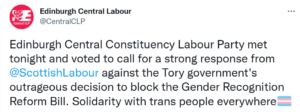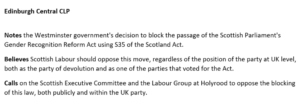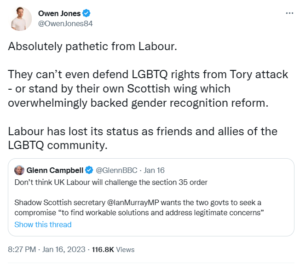Outrage as UK Tories attack Trans Rights and Scottish Devolution
Across the British state, writes Mike Picken, there is a growing opposition to the Conservative UK government’s unprecedented blocking of a Scottish Parliament legislative Bill on transgender rights passed last month – the Gender Recognition Reform (Scotland) Bill.
After weeks of misleading propaganda about what the Bill says and its implications for UK wide legislation, on 17 January the Tory government at Westminster announced they were going for the so-called ‘nuclear’ option of blocking the Bill using a ‘section 35 order’.
The ‘section 35’ mechanism is part of the 1998 legislation that created the Scottish Parliament and was only ever intended to be used as a last resort, if there was a grave threat of the Scottish Parliament trampling over other rights across the UK. During the passage of the 1998 legislation it was dubbed the ‘Governor-General’ clause, a reference to the British Empire’s colonial controllers, as it gives total discretion to a government minister to overrule democratic decisions. It has never been used before now and the legal basis presented by the UK government has been widely described as completely flimsy.
‘Section 35’ is being used to overturn the Scottish Bill as a political move by a reactionary government against progressive legislation, not because of an infringement of rights.
The Scottish National Party (SNP) government, based in the devolved Scottish Parliament have vigorously opposed the Tories’ move to overturn law, rightly describing it as an ‘outrage’ and a flagrant abuse of the rights of trans people in order to promote the Tory ‘culture wars’ as well as to attack the current devolution arrangements.
The SNP are strongly supported in this by the Scottish Green Party, who have been championing trans rights and who made a cooperation agreement in 2021 with the SNP explicitly to support the Scottish government moves to introduce this new legislation. Between them these parties have won around half the Scottish electorate in elections in recent years, while the Tories have slumped with polls showing them currently at around 15%.
Labour leadership equivocates while Labour members protest
The official Labour Party opposition in the UK Westminster parliament, led by Keir Starmer, has been appalling and tacitly gives succour to the Tories’ move to block the legislation. This is despite Labour party members in Scotland and across the UK also supporting and championing the legislation and despite Labour’s historic support for devolution to Scotland. Starmer made reactionary statements in a BBC TV interview on 15 January against the Bill’s extension of support for trans self-ID to 16 and 17 year olds that have been condemned by leading figures within the Scottish Party.
Labour Members of the Scottish Parliament (MSPs) who voted for the legislation and, so far, a Labour party constituency organisation in Edinburgh have challenged Starmer’s equivocal position and defended both trans rights and the democratic rights of the Scottish Parliament.


In the UK Westminster Parliament, Labour are the ‘Official Opposition’, but their solitary Scottish Labour MP there and the rest of Labour’s Front Bench leadership abstained in the parliamentary vote on the section 35 Order.
But in the devolved Welsh government the Labour Party’s First Minister, Mark Drakeford, the only elected leader of a Labour government in any part the UK union state, had welcomed the Scottish legislation and said he wanted the Welsh parliament, Senedd Cymru, to have similar powers to Scotland and to enact the same legislation. Drakeford went further in opposing the overturning of the Scottish Parliament Bill saying that the Welsh Government might back the Scottish Government in court.
Other Labour members across the UK have condemned the Tory attack on the LGBTQ+ community in Britain, with prominent journalist and writer Owen Jones calling Labour ‘absolutely pathetic’.
Several Labour Members of the Westminster Parliament (MPs) also protested in the chamber at the Tories’ attack on trans rights and Scottish democracy. But only 11 Labour MPs had enough principles to defy the leadership and vote against the section 35 Order, while the vast majority including the entire UK leadership abstained. However, Westminster MPs of the Liberal Democrats, Plaid Cymru and the Alliance Party and SDLP in Ireland indicated their strong support for the Scottish Parliament’s legislation and voted against the attempt to overturn it.
In wider society, particularly in Scotland, there has been strong opposition. Fifteen prominent and significant organisations supporting women’s rights in Scotland issued a joint statement opposing the blocking of the Bill by the Tories.
Part of a global development in trans rights – rejected by UK Tories
Across Europe and the rest of the world, other parliaments have introduced similar processes of ‘self-ID’ for trans people to that legislated in Scotland, including the 26-county Irish state and more recently the Spanish state. The World Health Organisation and the United Nations have welcomed moves in states to remove medical processes and support self-ID. These processes of gender self-ID by other states were previously recognised by the UK government, but as part of their rapid shift to the right the Tories have not only vetoed the Bill in Scotland but are also threatening to withdraw recognition of international systems of trans self-ID.
This is a significant component of the increasingly toxic direction of the Tory Party advocacy of ‘culture wars’ against progressive social policies that has followed in the aftermath of the Brexit process. It is a direction that is also being followed by the leadership of the UK Labour Party.
Gender Recognition Reform (Scotland) Bill would advance trans rights
The Gender Recognition Reform (Scotland) Bill was passed by the devolved Scottish Parliament, following six long years of debate, on 22 December 2022 by a two thirds majority of 86 to 39 votes. The Bill simplifies the process whereby a trans person living or born in Scotland could obtain a Gender Recognition Certificate (GRC) to change their gender on official documentation. It would change the process to a system of self-identification for living in their new identity for three months, rather than the current complex process of medical diagnosis of mental ill health and the need to live in a new gender for two years. The legislation would also apply to 16 and 17 year olds enabling them to obtain a GRC for the first time, with some slightly different procedures and safeguards to those of adults. Under Scottish devolved law 16 and 17 year olds already have the right to vote in local and Scottish elections and have long had the right to marry or enter civil partnership without parental approval (none of which apply in Tory-run England). This enabling of rights of young people in Scotland is also part of the divergence between mainstream Scottish opinion and the Tory ‘culture wars’ against.
Gender recognition processes have been designated in Scotland as part of a devolved system of civil registration. Part of the Tory argument is that Scotland should not have separate systems. But as the SNP rightly point out Scotland has always had a different legal system and different laws over, for example, marriage/civil partnership and divorce.
In the 2021 Scottish Parliament election, the manifestos of the SNP and in fact all the parties elected, including Scottish Labour, committed to introducing new legislation for gender self-ID and for the SNP this has been an issue first promised over six years . The SNP did not quite win a majority in Parliament under the system of Proportional Representation used in Scotland, but together with the Greens they have formed a stable majority government that introduced the Bill. The Bill went through extensive discussion and the largest public consultation process ever held by the Scottish Parliament and was supported by the Labour and Liberal Democrat parties.
Right wing groups opposed to the Bill, fictitiously claimed that it would weaken women’s rights and particularly alleged that it would be used by violent men to attack women. The Scottish government led by First Minister Nicola Sturgeon vigorously rejected these arguments, arguing that the Bill would assist trans people in Scotland to live more easily under their new gender, removing the delays and stigma associated with a medical diagnosis of mental illness (‘gender dysphoria’). The consultation indicated strong and informed support for the Bill across civil society, including the medical professions, though there was a vocal minority of traditionalists opposed.
A tiny minority of SNP MSPs (and MPs) opposed the legislation, with one minister resigning and several others voting against. But the vast majority of the SNP supported the legislation. Unfortunately, the Alba Party, a pro-independence minor split from the SNP led by former SNP leader Alex Salmond and a party outside the Scottish Parliament, also spoke and campaigned against the Bill destroying any credibility it had as a progressive organisation and becoming a repository for transphobic elements.
Scottish Greens in trans solidarity
The passage of the legislative Bill received fulsome support from the SNP’s government partner the left wing Scottish Green Party, whose spokesperson on Equalities, ecosocialist Maggie Chapman MSP, put forward an exemplary and passionate solidarity with the trans and wider LGBTQ+ community. (The Scottish Green Party should not be confused with the Green Party in England and Wales, a totally separate party with whom the Scottish Greens have broken off links due to their failure to tackle transphobia). They have also built strong links with the trans community campaigning for their rights – leading prominent trans women in Scotland include Ellie Gomersall, the President of National Union of Students Scotland, the leader of Rainbow Greens – the Green LGBTQI movement – Beth Douglas, and Glasgow’s first trans councillor Elaine Gallagher, all of whom are Scottish Green Party members and have been highly visible in the public defence of trans rights.
The only party in the Scottish Parliament opposed to the principle of the legislation was the Scottish Conservative and Unionist Party (the Tories in Scotland), but even then two MSPs from that party still voted for the legislation, one of whom is the Health spokesperson and a medical doctor whose own professional body and trade union, the British Medical Association, also support self-ID and the legislation.
All four Liberal Democrat MSPs supported the Bill, as did 18 of the 22 Labour MSPs. Liberal Democrat UK MPs at Westminster also indicated their strong unanimous support for the Bill and opposition to the Tory veto – the complete opposite of UK Labour.
The Bill was carefully worded during its passage through the Scottish Parliament to ensure it complies with UK law and in particular the Equality Act 2010. An amendment from a Labour MSP was supported by the SNP, Greens and Liberal Democrats to make explicit that the legislation did not affect the UK wide remit of the Equality Act. But the Tories repeatedly attempted to put forward wrecking amendments that would clearly violate UK law, such as dealing with matters ‘reserved’ for the Westminster parliament such as prisoners and refugees.
The Bill was eventually passed overwhelmingly by two thirds of MSPs and there were celebrations outside the Scottish Parliament in Edinburgh by trans people and their supporters.
Tory ‘culture wars’ and attack on unions
The Tories are developing a right wing agenda from the Donald Trump playbook over economic and social issues. In the vacuum that has opened up in the Party following the governmental collapse of Boris Johnson’s premiership and then the short lived and disastrous Liz Truss period, Rishi Sunak claims to be attempting to ‘steady the ship’. But the Tories are facing disastrous poll ratings and a massive strike wave of over a million workers fighting against deteriorating wages in a cost-of-living crisis. School and university teachers, health workers and the biggest nurses’ union, civil servants, and other groups of workers are all following in the aftermath of rail worker strikes – a strike movement beginning to focus on the 1st February as a coordinated day of action. So the Tories have decided to launch a full scale onslaught on workers’ rights in bringing in even more draconian anti trade union laws.
And now the Tories have chosen to also launch an attack on trans rights and devolution, taking on the Scottish Parliament and the SNP government by overturning devolved legislation.
Movement needed
The Tories could not choose the timing of their attack on the Scottish Parliament Gender Recognition Reform Bill and may have underestimated the degree of opposition they will face.
Although the Tories expectedly won their recent case at the UK Supreme Court against the Scottish Parliament’s right to call a new Scottish independence referendum, the legal grounds on which they are overturning the Scottish Parliament Bill are a different matter and subject to a ‘reasonableness’ yardstick. The Scottish government have already announced they will launch a legal challenge starting with a judicial review in the Scottish courts, but then expected to be resolved in the UK Supreme Court. There is a general view that one of the reasons that the Tories have chosen the Section 35 route is because it drags the issue out in the courts for many months longer than other routes available to them (and will cost the Scottish government more). The Scottish government may well succeed in the courts, though this is unlikely to be achieved until at least the autumn of 2023. Opinions among leading lawyers differ on the likelihood of the Tory section 35 order being overturned in the courts – but one of Labour’s leading law experts and a former Lord Chancellor and Justice minister, Charlie Falconer, has argued that the Tory move is fatally flawed legally and wrong; while the LGBT+ Labour group have welcomed this opinion, the Labour party’s leadership has not supported this view.
However, the legal challenge will be decided by conservative judges. Movement in support of trans rights and to defend devolution cannot rely on a rigged legal system, so there is a need for a massive mobilisations.
The SNP will attempt, justifiably, to use the attack on the Bill as a reason for advocating the end of the union and for Scottish independence. But the SNP are a thoroughly constitutional party, when what is increasingly needed to confront the Tory UK state is mass action. Furthermore, the Labour Party as an institution under the Starmer UK leadership is showing its ineffectiveness as a mobilising force, even bending to the Tory agenda in many respects. UK Labour doesn’t support the current strikes and it has refused to oppose the blocking of the Scottish Parliament Bill. Instead Keir Starmer plays to the Tory ‘culture wars’ agenda by opposing trans rights for under 18s. However, this is bringing the Party leadership increasingly into conflict with the base of the Party, including much of the Scottish Labour Party and its MSPs, and even some of its Westminster MPs who want to stand up for LGBTQ+ rights and devolution. Local organisations of Labour (CLPs/Branches) need to unite with the SNP and Scottish Greens government to defend devolution and trans rights. Labour should be mobilising public opinion to try to build a mass movement to bring down the Tories, but that will be difficult in an environment that has been dominated by members’ tribalist loyalties.
The death agony of the UK state?
Polls indicate a majority of Scottish voters and a significant section of Welsh voters are now questioning their country’s membership of a dramatically lopsided and reactionary UK ‘union’ of nations. The Tories’ actions on the Scottish Parliament Bill indicate that only independence can guarantee the democratic rights of Scottish and Welsh people. Labour give little encouragement that they will be much better at UK level, and have faced near collapse in Scotland with their lowest vote share in a century in 2021 due to their opposition to an independence referendum. However in Wales the Party has fared better electorally, by being pluralistic over the issue of independence and forging a governmental alliance with Plaid Cymru.
The Tories botched Brexit has also led to the collapse of devolution to the six counties of Ireland that are part of the UK state. The Tory UK government’s concessions to the far right religious ‘creationists’ of the Democratic Unionist Party over Brexit and other issues is increasingly challenged there and as the 25th anniversary of the Good Friday Agreement is approached, the question of Irish reunification is increasingly posed.
The toxic Tories face electoral oblivion but will attempt to hold on as long as possible. A full scale mobilisation of the working class and progressive movements is needed to finish them off.